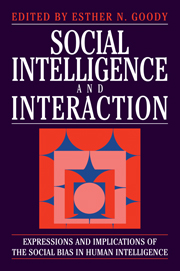 Social Intelligence and Interaction
Social Intelligence and Interaction Book contents
- Frontmatter
- Contents
- List of contributors
- Conventions used in transcripts
- Preface
- Introduction: some implications of a social origin of intelligence
- Part I Primary processes
- Part II The interactive negotiation of meaning in conversation
- Part III Genres as tools that shape interation
- Part IV Expressions of a social bias in intelligence
- Consolidated bibliography
- Index
Introduction: some implications of a social origin of intelligence
Published online by Cambridge University Press: 09 January 2010
- Frontmatter
- Contents
- List of contributors
- Conventions used in transcripts
- Preface
- Introduction: some implications of a social origin of intelligence
- Part I Primary processes
- Part II The interactive negotiation of meaning in conversation
- Part III Genres as tools that shape interation
- Part IV Expressions of a social bias in intelligence
- Consolidated bibliography
- Index
Summary
Recent work in ethology persuasively argues that the striking advance in primate intelligence over that of lower mammals is a product of social interdependence. This finding raises two kinds of questions for students of human society. In the first place, if the constraints of social interaction generated primate intelligence, what was the ratchet that led to the emergence of incomparably greater hominid intelligence, that is to Homo sapiens sapiens? For reasons outlined below, this stimulus seems likely to have been closely related to the gradual emergence of spoken language. Although discussion of the role of language in human evolution can, for the present at least, be only speculative, the problem has a fascination which justifies such exploratory thinking. We need to ask how language might have altered primate social life in ways that demanded, and rewarded, more complex intelligence.
A second question looks forward, not back; it concerns the contemporary nature of human intelligence. If human intelligence evolved in response to the challenges of social living, what are the implications for understanding thought, interaction and social forms? This introduction outlines some of the dynamics likely to be related to both questions in a way that is intended to raise problems for further analysis and research.
Themes from Working Papers
Primate intelligence as a response to social interdependence
In a seminal paper, ‘The social function of intellect’, Nicholas Humphrey (1976) has argued for a social origin of primate intelligence.
Information
- Type
- Chapter
- Information
- Social Intelligence and InteractionExpressions and implications of the social bias in human intelligence, pp. 1 - 34Publisher: Cambridge University PressPrint publication year: 1995
Accessibility standard: Unknown
Why this information is here
This section outlines the accessibility features of this content - including support for screen readers, full keyboard navigation and high-contrast display options. This may not be relevant for you.Accessibility Information
- 7
- Cited by